The General Theological Seminary (GTS) today set out its plans for the future which will see the renovation of its historic campus in the heart of New York City and the expansion of its innovative hybrid Master of Divinity (MDiv) program.
After entering an Affiliation Agreement with Virginia Theological Seminary (VTS) in 2022, GTS has drawn up a five-year plan with the three core aims of providing a flagship MDiv program that responds to the changing needs of the church, tackling previously deferred campus maintenance, and establishing a new business model to ensure its long-term financial stability.
GTS currently has an operating budget deficit of more than $2 million per year, due to a downturn in the market, a fall in revenue, rising operating costs from urgent campus maintenance, and increased staffing costs.
The five-year plan aims to return GTS to an operating surplus in 2024. The Affiliation Agreement with VTS reduces GTS’ operating expenses through the provision of shared services, including top level management. Further steps being taken to reduce expenses and increase income are set out below.
At the heart of the five-year plan is the expansion of GTS’ innovative hybrid MDiv. This program is designed to increase accessibility and responds to the growing demand from students unable to relocate due to family and work commitments, to train for the ministry in their current context. In line with GTS’ commitment to inclusion and social justice, tuition for the program is fully funded.
The hybrid MDiv is delivered through a combination of synchronous and asynchronous online courses, and week-long intensives at GTS’ New York City campus several times each year. It focuses on high-level academic courses that enable intellectual and spiritual growth in context and is supported by mentor teams and a cohort-based learning philosophy. The program includes a field placement component which takes a competency-based approach to teach skills such as leadership, communication, pastoral care, administration, finance, and governance.
The program’s structure enables teaching by GTS faculty to be supplemented by VTS faculty and outside talent, with Dr. Rowan Williams and Brian McLaren set to teach courses in 2023-24. Each cohort will consist of 15 students, and the program will take three to four years to complete.
Feedback from the first cohort of students who recently completed their second on-campus intensive has been overwhelmingly positive. Students praised the program’s accessibility, as well as the spiritual formation and historic pattern of worship at which GTS excels. They also spoke of the strong connection they felt with each other, and with GTS and its history.
Teaching the hybrid MDiv requires four full-time faculty, none of whom need to be in residence. As such, the number of faculty at GTS will be reduced from eight to four, and faculty will no longer live on campus from the end of fiscal year 2023. All faculty at GTS are on contracts that terminate at the end of June 2024. All faculty members under contract were told their role was highly likely to be temporary when they were appointed. The Affiliation Agreement commits to keeping the Very Rev. Michael DeLashmutt on as the Senior Vice President of GTS. The remaining three vacancies will be advertised as internal searches for which existing faculty can apply. Those members of faculty who are not appointed will have their contracts bought out in June 2023.
The second part of the five-year plan focuses on strengthening GTS’ foundation through campus restoration. As the first seminary of The Episcopal Church and the oldest continuously operating seminary in the Anglican Communion, GTS has a duty to steward its historically significant campus. Priority will be given to the Chapel of the Good Shepherd, revenue generating assets such as the conference center, and investing in the seminary’s grounds. The seminary library has already been fully restored in 2010 thanks to a major gift.
The third part of the plan will see GTS adopt a new business model under which it leverages its facilities to support its mission, with income from space rentals and hosting events used to fund deferred maintenance. The focus on the hybrid MDiv as the sole program for the coming five years enables more campus space to be used for revenue generating activities. In addition, the Board has voted to start preparations for a Capital Campaign to assist with the renovation of the Chapel and repairs to the campus.
Over the medium term, once the campus is renovated, there are plans for a small residential community – an intentional worshipping community modeled on St. Anselm’s at Lambeth Palace in the U.K. – to be reintroduced to the Close to engage in meaningful service and ministry within the city. GTS will also launch a range of non-credit, continuing education programs in faith and public life, along with programs that build on its existing partnerships with Good Shepherd New York, Temple Emanu-El, the Chelsea Music Festival, and the Foundation for Spirituality and the Arts.
The Very Rev. Ian S. Markham, Ph.D., President of GTS, said: “During the academic year, the Close in Chelsea will continue to have students in week-long residencies formed by worship in the Chapel of the Good Shepherd. In time, this will be augmented by an intentional community worshipping in that Chapel. General will continue to be a vibrant witness to a catholicity of faith and outlook for The Episcopal Church.”
Senior Vice President the Very Rev. Michael DeLashmutt, Ph.D., said: “General Seminary is changing to meet the needs of a changing world. As it does, it remains grounded in its iconic home in Chelsea and its historic rhythms of daily prayer, while also modelling new ways of engaging ministry, worship, and leadership. We are embracing the Seminary’s third century of mission with hope for what lies ahead.”



